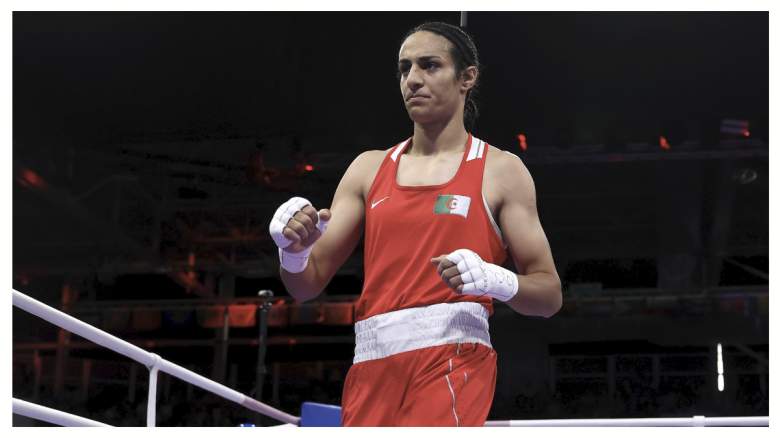
Biological gender and XY chromosome testing have become the subject of Olympic controversy in the wake of Algerian boxer Imane Khelif‘s win against Italy‘s Angela Carina, who withdrew after 46 seconds following a punch to her face.
Responding to critics who’ve questioned Khelif’s biological gender, the International Olympic Committee’s Mark Adams said Khelif and another boxer, Lin Yu-ting of Taiwan, “were not transgender athletes and should not be described as such,” according to The New York Times.
Angela Carini, Khelif’s opponent, ended the match early after the punch on August 1 at the Paris Olympics, declaring, “This is unjust” while sobbing and refusing to shake Khelif’s hand. The incident has sparked a global debate about gender identity and Olympic competition.
The International Boxing Association (IBA) and the International Olympic Committee (IOC), which has oversight over the Olympic boxing competition, are in a war of words about whether Khelif, who also competed in the Tokyo Games in 2021, should be allowed to compete in women’s events.
IBA president Umar Kremlev told Russian news agency TASS that Khelif and Yu-ting had “XY chromosomes,” the typical genetic makeup of males, and that is why they were disqualified from the World Championships in 2023, Reuters reported.
The credibility of the IBA has been questioned, however. The IOC stripped the IBA “of recognition last June, saying it had failed to complete reforms on governance, finance, and ethical issues,” Reuters reported in May.
According to Reuters, “relations between the two bodies soured following Russia’s invasion of Ukraine in 2022, with the IBA run by Russian Kremlev and with Russian energy firm Gazprom being its main sponsor,” although Kremlev said that sponsorship has ended. According to Daily Beast, the IBA’s decision to disqualify Khelif came after she defeated a Russian boxer.
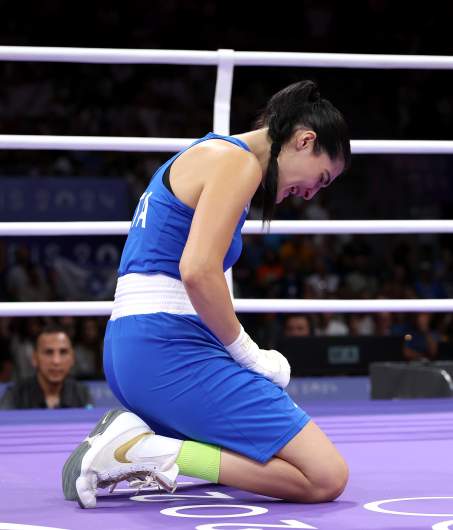
GettyAngela Carini of Team Italy abandoned her women’s 66kg preliminary round match against Imane Khelif of Team Algeria in Paris.
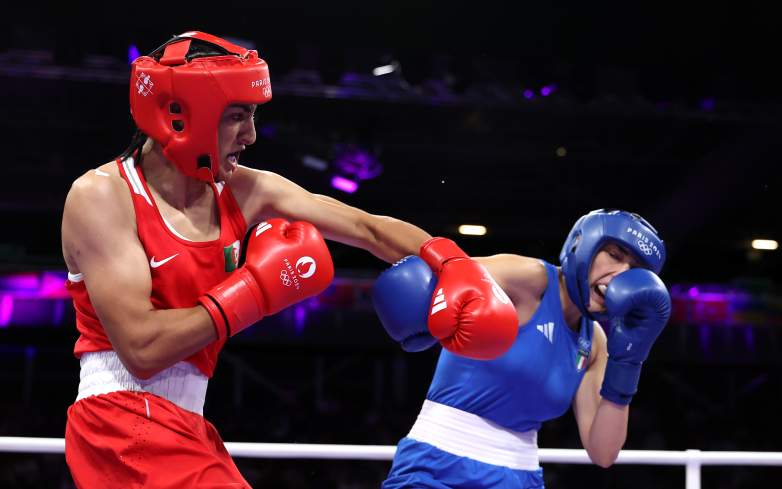
Getty Imane Khelif of Team Algeria and Angela Carini of Team Italy exchange punches during the Women’s 66kg preliminary round match on day six of the Olympic Games Paris 2024 at North Paris Arena on August 01, 2024, in Paris, France.
“Khelif and the Algerian Olympic Committee (COA) both denied the claims” about her having XY chromosomes, Fox News reported.
The IOC’s decision to end sex testing of athletes in 1999 is also a focal point of controversy. “The decision to abandon compulsory gender verification in Olympic competition was taken in 1999, following many years of debate,” according to a 2008 journal article, “Intersex and the Olympic Games,” which appears on the website of the National Library of Medicine. The IOC said in a recent statement: “As with previous Olympic boxing competitions, the gender and age of the athletes are based on their passport.”
“Although initially taken as a temporary stance, this policy continues at present. The IOC has the authority to request gender verification on an individual basis if there is suspicion of masquerading. No complaints have been voiced by competing nations regarding possible gender misrepresentation,” that article says.
Although social media posts have claimed Khelif is a man, the IOC statement refers to Khelif and Yu-ting as “female athletes.” As an example of such social media posts, Olympic medalist Claressa Shields wrote on X, “Just did an interview with @FoxNews about this! And I’m taking a stand! Women should fight against women, men fight against men and transgenders fight against transgenders! This is ridiculous 😡 and I’m heartbroken for the women boxers at the Olympics!”
An article by UNICEF says that Khelif has long identified as female, calling Khelif “one of Algeria’s top female boxers.”
That article paints a detailed background of Khelif’s childhood.
“Imane recalls how at 16 she managed to excel in football in her rural village in Tiaret in western Algeria despite football not being seen as a game fit for girls. Moreover, the boys in her village felt threatened and picked fights with her. Ironically it was her ability to dodge the boys’ punches that got her into boxing,” UNICEF wrote, adding that Khelif’s father, a welder, “did not approve of boxing for girls.”
Khelif told UNICEF, “My dream is to win a gold medal. If I win, mothers and fathers can see how far their children can go. I particularly want to inspire girls and children who are disadvantaged in Algeria.”
Warring Statements Have Been Released About the Gender Identity & Qualifications of Imane Khelif in Women’s Competitions
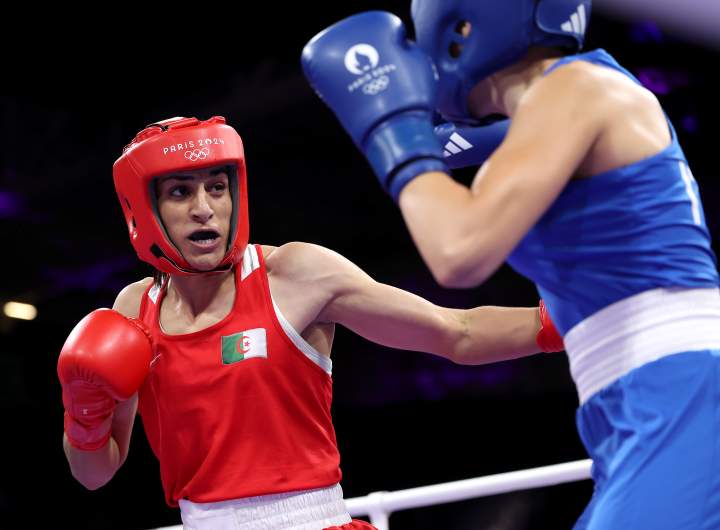
GettyImane Khelif of Team Algeria punches Angela Carini of Team Italy during the Women’s. 66kg preliminary round match on day six of the Olympic Games Paris 2024 at North Paris Arena on August 01, 2024 in Paris, France.
The IBA and IOC have released warring statements about Khelif and Yu-ting.
“On 24 March 2023, IBA disqualified athletes Lin Yu-ting and Imane Khelif from the IBA Women’s World Boxing Championships New Delhi 2023. This disqualification was a result of their failure to meet the eligibility criteria for participating in the women’s competition, as set and laid out in the IBA Regulations. This decision, made after a meticulous review, was extremely important and necessary to uphold the level of fairness and utmost integrity of the competition,” the IBA’s statement says.
However, the statement is vague on the exact testing.
“Point to note, the athletes did not undergo a testosterone examination but were subject to a separate and recognized test, whereby the specifics remain confidential. This test conclusively indicated that both athletes did not meet the required necessary eligibility criteria and were found to have competitive advantages over other female competitors,” the statement says.
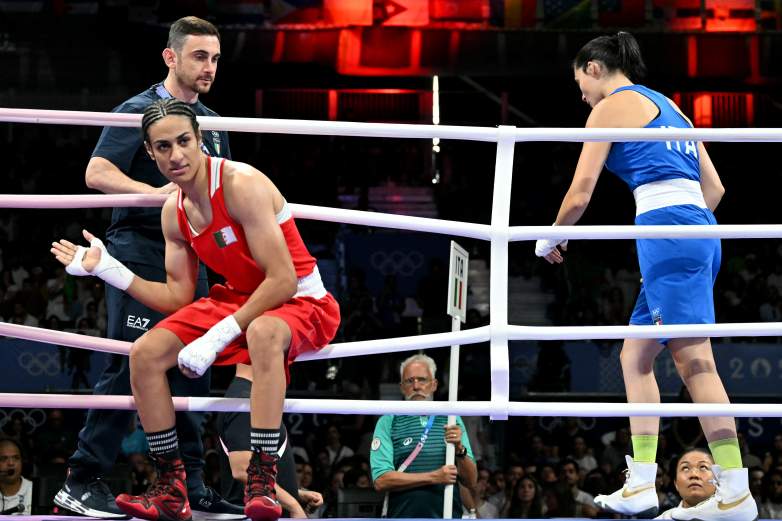
Getty Algeria’s Imane Khelif (in red) and Italy’s Angela Carini leave after their women’s 66kg preliminaries round of 16 boxing match during the Paris 2024 Olympic Games at the North Paris Arena, in Villepinte on August 1, 2024.
“The decision made by IBA on 24 March 2023, was subsequently ratified by the IBA Board of Directors on 25 March 2023. The official record of this decision can be accessed on the IBA website here IBA Board of Directors Meeting Minutes,” The IBA’s statement says. Khelif initially appealed but then withdrew the appeal, the statement says, adding that Yu-ting did not appeal.
“The disqualification was based on two tests conducted on both athletes as follows: Test performed during the IBA Women’s World Boxing Championships in Istanbul 2022. Test performed during the IBA Women’s World Boxing Championships in New Delhi 2023,” the statement says.
It continues:
Our Committees have rigorously reviewed and endorsed the decision made during the World Championships. While IBA remains committed to ensuring competitive fairness in all of our events, we express concern over the inconsistent application of eligibility criteria by other sporting organizations, including those overseeing the Olympic Games. The IOC’s differing regulations on these matters, in which IBA is not involved, raise serious questions about both competitive fairness and athletes’ safety.
For clarification on why the IOC permits athletes with competitive advantages to compete in their events, we urge interested parties to seek answers directly from the IOC.
However, the IOC painted a very different picture in its own statement. It reads:
Every person has the right to practise sport without discrimination.
All athletes participating in the boxing tournament of the Olympic Games Paris 2024 comply with the competition’s eligibility and entry regulations, as well as all applicable medical regulations set by the Paris 2024 Boxing Unit (PBU) (please find all applicable rules here). As with previous Olympic boxing competitions, the gender and age of the athletes are based on their passport.
These rules also applied during the qualification period, including the boxing tournaments of the 2023 European Games, Asian Games, Pan American Games and Pacific Games, the ad hoc 2023 African qualifying tournament in Dakar (SEN) and two world qualifying tournaments held in Busto Arsizio (ITA) and Bangkok (THA) in 2024, which involved a total of 1,471 different boxers from 172 National Olympic Committees (NOCs), the Boxing Refugee Team and Individual Neutral Athletes, and featured over 2,000 qualification bouts.
The PBU used the Tokyo 2020 boxing rules as a baseline to develop its regulations for Paris 2024. This was to minimise the impact on athletes’ preparations and guarantee consistency between Olympic Games. These Tokyo 2020 rules were based on the post-Rio 2016 rules, which were in place before the suspension of the boxing International Federation by the IOC in 2019 and the subsequent withdrawal of its recognition in 2023.
We have seen in reports misleading information about two female athletes competing at the Olympic Games Paris 2024. The two athletes have been competing in international boxing competitions for many years in the women’s category, including the Olympic Games Tokyo 2020, International Boxing Association (IBA) World Championships and IBA-sanctioned tournaments.
These two athletes were the victims of a sudden and arbitrary decision by the IBA. Towards the end of the IBA World Championships in 2023, they were suddenly disqualified without any due process.
According to the IBA minutes available on their website, this decision was initially taken solely by the IBA Secretary General and CEO. The IBA Board only ratified it afterwards and only subsequently requested that a procedure to follow in similar cases in the future be established and reflected in the IBA Regulations. The minutes also say that the IBA should “establish a clear procedure on gender testing”.
The current aggression against these two athletes is based entirely on this arbitrary decision, which was taken without any proper procedure – especially considering that these athletes had been competing in top-level competition for many years.
Such an approach is contrary to good governance.
Eligibility rules should not be changed during ongoing competition, and any rule change must follow appropriate processes and should be based on scientific evidence.
The IOC is committed to protecting the human rights of all athletes participating in the Olympic Games as per the Olympic Charter, the IOC Code of Ethics and the IOC Strategic Framework on Human Rights. The IOC is saddened by the abuse that the two athletes are currently receiving.
The IBA’s recognition was withdrawn by the IOC in 2023 following its suspension in 2019. The withdrawal of recognition was confirmed by the Court of Arbitration for Sport (CAS). See the IOC’s statement following the ruling.
The IOC has made it clear that it needs National Boxing Federations to reach a consensus around a new International Federation in order for boxing to be included on the sports programme of the Olympic Games LA28.
The History of Gender Testing in the Olympic Games Is Complex
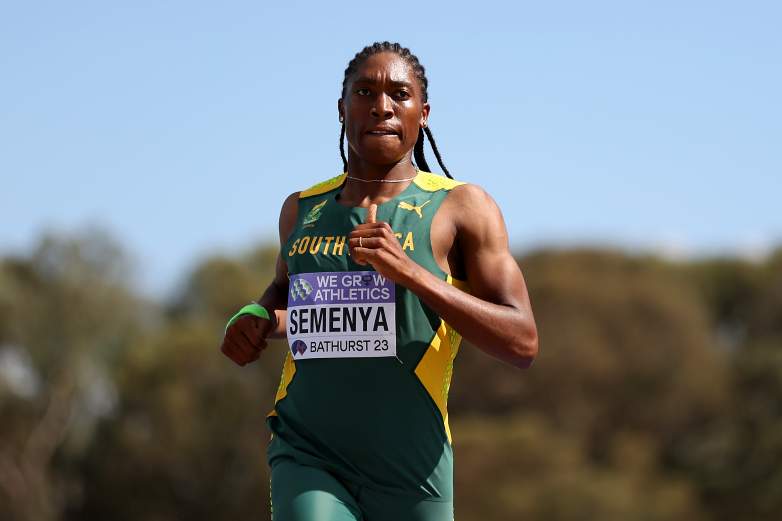
GettyCaster Semenya of Team South Africa competes in the Mixed Relay race during the 2023 World Cross Country Championships at Mount Panorama on February 18, 2023, in Bathurst, Australia.
According to The New York Times, “The other issue involves athletes like Caster Semenya, a two-time Olympic champion in track and field, who have a difference of sexual development known as 46XY DSD.” However, it’s never been established that Khelif has 46XY DSD or intersex, to be clear. Still, this angle complicates the discussion about gender identity and sports.
What is 46XY DSD? “These athletes are considered legally female, or intersex, and have X and Y chromosomes, the typical male pattern; testes or ambiguous genitalia; natural testosterone levels in the male range; and respond to testosterone in ways typical to men,” the Times reported.
The 2008 journal article, “Intersex and the Olympic Games,” says, “Intersex refers to the atypical appearance of the external genitalia at birth where they differ from the usual development of either sex and create difficulty in sex assignment.2 This condition is uncommon, with an estimated incidence of 0.018%.”
That article added: “DSDs are a hugely complex group of conditions. These abnormalities challenge both our scientific and social understanding of what ‘sex’ and ‘sexual differentiation’ are.”
The history of gender testing at the Olympics, described in that article in great detail, is a complicated one fraught with controversy.
According to that article, “Historically, sport’s first ‘encounter’ with DSD was in 1936 at the infamous Berlin Olympics, commonly known as Hitler’s Olympics,” when questions were raised about the gender identity of athletes Stella Walsh and Helen Stephens amid Hitler’s persecution of Jewish athletes. When Walsh was murdered years later in a bank robbery, it was discovered Walsh “possessed ambiguous genitalia and abnormal sex chromosomes,” the article says.
Similar controversy raged around Russian Olympians Irina and Tamara Press in the 1950s, the article says.
According to that article, “compulsory gender verification in the form of a gynecological examination was introduced prior to the 1966 European athletics championship” and involved forcing athletes “to stand naked in front of a committee” that inspected their “external genitalia.”
For the 1968 Olympics, “Barr body detection was introduced,” involving a buccal smear test, the article says. The “Barr body is only found in cells with XX sex chromosomes.” Ewa Klobukowska, a Polish sprinter, was disqualified from the Olympic competition due to the test, the article says.
However, the article notes that the Barr test has its issues. “Confirming or refuting sex purely via a chromosomal test fails to take account of the complexities of sex determination itself,” it says.
“Women with complete androgen insensitivity syndrome would have been barred from competing due to the presence of XY sex chromosomes despite an entirely female phenotype. Men with Klinefelter’s (XXY) would be eligible to compete as females due to the presence of the Barr body on cytological analysis and would potentially gain a clear sporting advantage because of their physique,” the article reads.
In 1991, Barr body testing was replaced with a test called “PCR analysis,” which involves DNA testing of genes after obtaining buccal smears, the article says.
“All women were screened in Olympic competition from 1992 onwards, with over 2000 tests performed at the 1992 Barcelona games. Fifteen tests were reported positive, with a further eight out of over 3000 positive tests at the Atlanta games in 1996,” the article says. “Of the eight athletes found to have the SRY locus in Atlanta, seven had androgen insensitivity syndrome and the final athlete had 5-alpha-reductase deficiency. All athletes were allowed to compete in their respective competition.”
The article says: “There is no evidence that female athletes with DSDs have displayed any sports-relevant physical attributes which have not been seen in biologically normal female athletes. However, numerous female athletes have been unfairly barred from competing.” Then, in 1999, sex testing was eliminated at the Olympics, according to the article.
Comments
Boxer Imane Khelif Faces Scrutiny Over Biological Gender After 46-Second Match